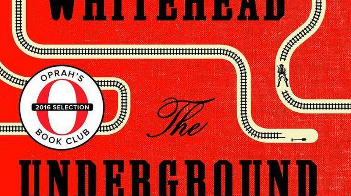Event of the Week: Colson Whitehead at Seattle Public Library on Saturday, September 17th

Remember when Oprah chose Jonathan Franzen’s novel The Corrections for her book club and Franzen publicly chafed at the designation? The poor dear seemed to regret the mainstream success that came with Oprah’s seal of approval; Franzen called the books that Oprah liked “schmaltzy,” and the kiss of Oprah’s commercial approval caused him to preen over his wounded literary pride for a decade.
You will never see Colson Whitehead shying away from Oprah’s love for his latest novel, The Underground Railroad. He embraced the giant “O” stickers on the front of his book with gratitude, and he’s been riding the wave of mainstream acceptance ever since. Why did the two novelists respond so differently to Oprah’s Book Club? Well, I think part of it comes down to basic manners: Franzen is by many accounts a brat, while Whitehead has never been anything but humble and forthcoming in his many Seattle-area appearances.
But there’s more to it than that. Whitehead is a fantastic novelist, one of the best in America today. (Certainly better than Franzen.) But he’s never been able to build up the audience that he deserves because every single one of his books is different from the others. Whitehead’s debut novel, The Intuitionist, imagined an alternate New York with dueling elevator inspector guilds. John Henry Days is a big, bold examination of the John Henry mythology. Apex Hides the Hurt is a dark, nasty satire of America’s embrace of shiny surfaces. Sag Harbor is a quiet, tender semiautobiographical novel about being an African-American kid in an affluent white vacation community. And Zone One is a zombie novel. As much as readers like to think of themselves as adventurous, folks get upset when an author’s new book bears no relation to the last. Franzen succeeds in part because he writes about unhappy white families again and again; Whitehead has had difficulty gaining readers because he never follows the same path twice.
Oprah is right: The Underground Railroad is Whitehead’s best book yet. It’s the story of a runaway slave named Cora in a world where the Underground Railroad is literally a train that runs underground. The America that Cora sees in her travels is at once very like our own and wildly divergent. While the terrors that Cora encounters may not exactly resemble the historic record, they capture the rotten spirit of slavery in chilling detail.
This is the rare critically acclaimed bestseller that deserves every ounce of its adoration, and more. The hype is real. You can believe Oprah, and its scores of other fans, including some guy who took The Underground Railroad on summer vacation and can’t stop talking about its “terrific…powerful” portraiture of race in America. That fan’s name is Barack Obama.
(Colson Whitehead reads at the Central branch of the Seattle Public Library downtown on Saturday, September 17th at 7 pm. The reading is free.)